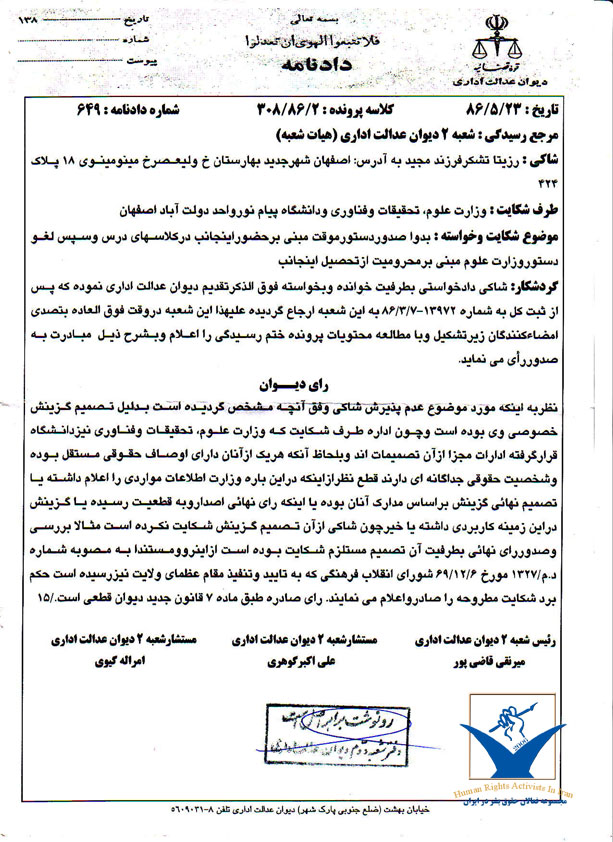 Editor’s Note: Upon its founding over 30 years ago, the Islamic Republic of Iran adopted a policy of barring Baha’i students from universities and all institutions of higher education. Occasionally, a few Baha’is have been allowed entrance; however, in almost all cases they were identified as being Baha’i during their first or second year of education and were then expelled without any further explanation. Below is a letter written by a group of Baha’i students deprived of higher education with respect to their appeal to the Court of Administrative Justice of Iran, as published by Human Rights Activists News Agency, which IPW is pleased to publish in translation.
Editor’s Note: Upon its founding over 30 years ago, the Islamic Republic of Iran adopted a policy of barring Baha’i students from universities and all institutions of higher education. Occasionally, a few Baha’is have been allowed entrance; however, in almost all cases they were identified as being Baha’i during their first or second year of education and were then expelled without any further explanation. Below is a letter written by a group of Baha’i students deprived of higher education with respect to their appeal to the Court of Administrative Justice of Iran, as published by Human Rights Activists News Agency, which IPW is pleased to publish in translation.
A Letter by Baha’i Students
In previous years, dozens of Baha’i students who were deprived of higher education made their appeal to the Court of Administrative Justice of Iran, submitting complaints against the Ministry of Science, Research and Technology for prohibiting them from entering universities, hoping that their grievances would be heard and the restrictions lifted. The students filed complaints after their repeated attempts to contact the Ministry of Science, Research and Technology proved fruitless.
Throughout the years, Baha’i students have faced many obstacles in their desire to receive higher education. They have contacted the appropriate authorities at different offices in relevant ministries and organizations, including the Organization for Testing and Evaluation, the Ministry of Science, and the Ministry of the Interior. However, despite the cooperation and expressions of sympathy by many of those in charge, the authorities have always conjured up excuses for breaching the legal rights of these Baha’is in their native land.
Unfortunately, the Court of Administrative Justice of Iran has proven to be no exception in its treatment of Baha’i students’ cases. The judges of this court, based on the article of law, do not have the power to rule against previously approved policies of the Supreme Council of Cultural Revolution. Since, by a ruling of the Supreme Council, Baha’is are forbidden from obtaining higher education, the judges of the Court of Administrative Justice are unable to serve justice and to uphold the rights of Baha’i students. One of the judges of Branch 5 of the Court of Administrative Justice showed the text of the Supreme Council’s ruling to a Baha’i student before apologizing and telling him that he was unable to help him with his plea.
Even on occasions where cases of Baha’i students are accepted by the Court of Administrative Justice, no favorable result has ensued. In response to the request that it “overturn the deprivation order by the Ministry of Science”, the Court of Justice announced the “rejection of the requested appeal” and communicated an outcome which read in part, “based on article number D.M. dated February 25, 1980, of the Supreme Council of Cultural Revolution, sanctioned by the Supreme Leaders, your appeal is hereby rejected”.
Baha’i students who, like their own parents who were denied the opportunity to finish their studies in the early 80s — many had as few as two credits remaining to complete their college studies and obtain university degrees — have had no choice but to believe that the rhetoric of “religious freedom” in their homeland is nothing other than meaningless chatter.
A Baha’i student’s religious convictions are considered an offence that is counteracted by denying him education. What can be the reason for depriving an 18 year old from entering university, a youth who has done nothing wrong, who by the testimony of his classmates has been a moral leader and a role model, who based on his beliefs has a religious obligation to obey his government and to wholeheartedly serve his country? Is there any rational justification for this blockade? With shock and disbelief, the sympathetic employee of the Organization for Test and Evaluation searched through files of outstanding students with high marks, trying to uncover the reason why they were denied access to education. After an hour of investigation yielded nothing, he wrote “Baha’i” on the file and said, “This is an issue that we have had with Baha’is for over twenty years”.
If there is a reason for this action, why isn’t it communicated by the Ministry of Science? Why should a Baha’i student have to wait for hours to meet with the authority in charge of minorities affairs, only to finally hear an apologetic employee say, “The responsible authority is on vacation, come back in 20 days”?
Most painful of all is the effort to justify the obvious oppression inflicted on Baha’i students by accusing them – or to say it more accurately, by accusing every Baha’i, from toddler to bed-ridden elder – of being a spy or being stirred up by foreigners. This is the same accusation because of which the seven previous informal leaders of the Baha’i community of Iran have been languishing in confinement for months. These are the Baha’i leaders who for years tried to reinstate Baha’is’ rights to education — leaders who, like other Iranians, love their homeland, and who have been yearning and still yearn to serve their country, the birthplace of their faith.
Signed
Fada Mahmudi, Afruz Mirzaei, Masoud Mahmudi, Rozita Tashakor and Jila Keshavarz Rahbari.
Below is a copy of a notarized letter from the Court of Administrative Justice of Iran, in response to the appeal of Rozita Tashakor, one of the above mentioned Baha’i students, rejecting her appeal based on article number D.M., dated February 25, 1980, of the Supreme Council of Cultural Revolution, sanctioned by the Supreme Leader.
[Posted on September 30, 2009, at hra-news. Translation by Iran Press Watch.]

October 9, 2009 8:45 am
Martin: “should EXPECT persecution and therefore should not be surprised or perplexed when it happens”… so would you EXPECT people to say, “Oh, I’m a Bahá’í, this is logical, I’ll jut sit here and have my rights squashed because that’s what’s to be expected!” It’s completely normal to seek, in a peaceful manner, that your rights be respected.
“Baha’is don’t get involved in politics and shouldn’t be surprised when the government doesn’t support them.”
What a ridiculous statement. I may have agreed with, “Bahá’ís don’t get involved in politics. Bahá’ís in Muslim countries shouldn’t be surprised when A MUSLIM government doesn’t support them.” as two completely separate statements… because how is requesting your rights be respected “getting involved in politics”?
October 11, 2009 4:30 pm
Dear Martin,
What are you saying? If you are in a minority then expect persecution? Please, reassess what you are saying. What a very sad world it would be if everyone subscribed to that point of view. I am a Baha’i and i certainly do not expect to be persecuted nor do I wish to persecute. The Quran, does not favour persecuting anyone. You are quite mistaken if that is what you think and that is not Islam either.
What we do have is a mentality of “Constructive Resiliance” at whatever is thrown at the Baha’i Community. The point is to treat everyone with loving kindness – even those who persecute you. This does not mean to just roll over and accept every injustice. Peacefully and respectfully pursuing your rights as a human being is perfectly legitimate. By doing so, the oppressor may see the error of their actions.
Depriving someone of a right to life because of their beliefs is unacceptable in any culture or religion.
October 12, 2009 2:27 pm
Justice is not a political aspiration, it is a moral and spiritual imperative. If the worldwide Baha’is community does seek justice on behalf of the Baha’i of Iran, who will? Many others besides the Baha’is have asked that Iranian citizens receive fair and humane treatment. The government of Iran is on record as having signed and agreed to internationally recognized conventions for human rights. Yet the brutal mistreatment of Iranian Baha’is persists. The Baha’i prisoners of Evin Prison were denied access to their lawyers. While we may hearken to historical persecutions of the past, let us reflect that early Christians and Muslims did not have the communication tools we have today. If early Christians and Muslims had be given access to instantaneous world-wide communication, is there any doubt that they would have used it?
October 12, 2009 5:01 pm
Any news from Yaaraan?
October 12, 2009 9:02 pm
The trial of the former Yaran is still set 6 days from today, October 18th.
October 16, 2009 4:10 am
Has the Universal House of Justice ever acted to seek justice for the Baha’is of Iran through the International Criminal Court or Permanent Court of Arbitration to adjudicate these many injustices?
October 16, 2009 6:54 am
According Human Rights News Agency, the trial of former 7 Baha’i leaders is set Oct.18th.
http://hra-news.org/news/7122.aspx